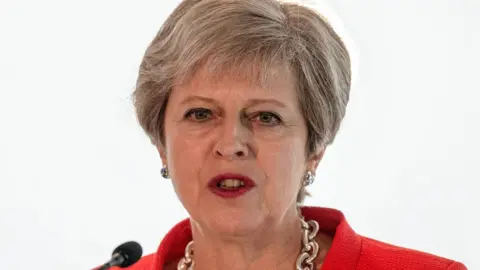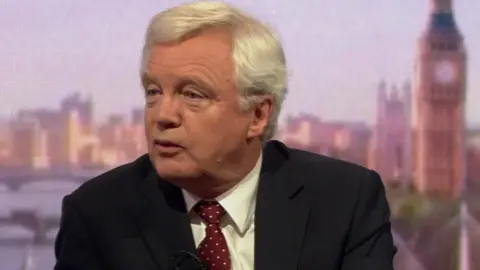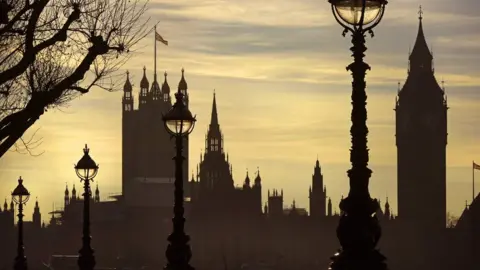Brexit: May vows no compromise with EU on Brexit plan
 AFP/Getty
AFP/GettyTheresa May has insisted she will not be forced into watering down her Brexit plan during negotiations with the EU.
Writing in the Sunday Telegraph, the prime minister says she will "not be pushed" into compromises on her Chequers agreement that are not in the "national interest".
But Mrs May also warns she will not "give in" to those calling for a second referendum on the withdrawal agreement.
She says it would be a "gross betrayal of our democracy and... trust".
The Chequers agreement would see the UK agreeing a "common rulebook" with the EU for trading in goods, in an attempt to maintain friction-less trade at the border.
But critics say it will leave the UK tied to EU rules and prevent Britain from striking its own trade deals in years to come.
The People's Vote, a cross-party group including some MPs, is calling for a public vote on the final Brexit deal.
The UK is on course to leave the EU on 29 March but has yet to agree how its final relationship with the bloc will work. The EU has suggested that November is the latest a deal could be finalised.
The government had previously ruled out another referendum.
The prime minister writes that the coming months are "critical in shaping the future of our country", but that she is "clear" about her mission in fulfilling "the democratic decision of the British people".
She adds that following the Chequers agreement in July - which led to the resignation of two cabinet ministers - "real progress" has been made in Brexit negotiations.
While there is more negotiating to be done, Mrs May writes: "We want to leave with a good deal and we are confident we can reach one."
The government has been preparing for a no-deal scenario, even though this would create "real challenges for both the UK and the EU" in some sectors, she says.
But the PM adds: "We would get through it and go on to thrive."
She goes on to insist in her article that her government will not back another vote.
"In the summer of 2016, millions came out to have their say," she writes.
"In many cases for the first time in decades, they trusted that their vote would count; that after years of feeling ignored by politics, their voices would be heard.
"To ask the question all over again would be a gross betrayal of our democracy - and a betrayal of that trust."

David Davis, the former Brexit secretary who quit over the Chequers agreement, said he was also against a second referendum.
Speaking on the BBC's Andrew Marr Show, he said he would vote against the Chequers plan in any Commons vote, adding that it would be "almost worse" than staying in the EU.
He said the problems around the Northern Ireland border with the Irish Republic had been "heavily overemphasised" in the past.
"It's a border already - it works perfectly well with careful co-operation between sides," he said, and with "political will" from the UK and the Republic, it could continue to do so.

Analysis: Back to school for politics
By Chris Mason, BBC political correspondent

Welcome to the new term in politics - it is getting loud already.
No sooner has the prime minister said she is committed to her Brexit blueprint than one of her previously loyal MPs has suggested signing up to it would be a "humiliation".
And no sooner has she insisted that another Brexit referendum would be a "gross betrayal of our democracy" than one of her own party donors says that is "balderdash".
It seems, to put it mildly, that we are in for quite a political term.
Both the big political parties at Westminster have their fair share of turmoil and the stakes could not be higher.
But if the last few months, or the last few years, have taught us anything, it is that we can be very confident there will be a few bumps in the road - whether a Brexit deal is done or not.

Writing in the same paper, Conservative MP Nick Boles - a former minister who backed Remain - said the Chequers policy had "failed" and he could no longer support it.
He wrote that the EU was treating the plan as "an opening bid", and the UK was facing "the humiliation of a deal dictated by Brussels".
Instead, Mr Boles, who is a member of the Brexit Delivery Group, believes the two-year transition period - which the government describes as an implementation period - should be scrapped and replaced with the UK becoming part of the European Economic Area for three years - giving more time for a trade deal to be negotiated.
"The plan I am setting out represents our only hope of a better Brexit," he added.
The People's Vote launched earlier this year to campaign for a vote on any final Brexit deal, and has a number of high-profile backers, including Sir Patrick Stewart and BBC football anchor Gary Lineker.
It has also secured funding from donors including Julian Dunkerton, co-founder of fashion label Superdry - who has given the largest donation of £1m to the group.
One of its supporters, the Labour MP Chuka Umunna, said the impetus had shifted toward a public vote over the summer and it would be a "betrayal of democracy" for Theresa May "to force a bad deal - or no deal - on Britain without giving the public the chance to have a final say".
The Conservative donor and former Rolls-Royce chairman Sir Simon Robertson has also joined calls for a second referendum, saying he is "deeply depressed" at the tone of the Brexit debate.
"I think it is complete balderdash to say the people have spoken, therefore you can't go back. The people can speak again - why can't we have another vote on it?" he asked, in an interview with the the Observer.
Earlier this week, it was revealed in a leaked memo that the People's Vote wants Labour MPs and activists to submit a motion at the party's conference this month, committing Labour to backing a new referendum on the final deal.
The party's current policy position is to respect the result of the 2016 Brexit referendum.
